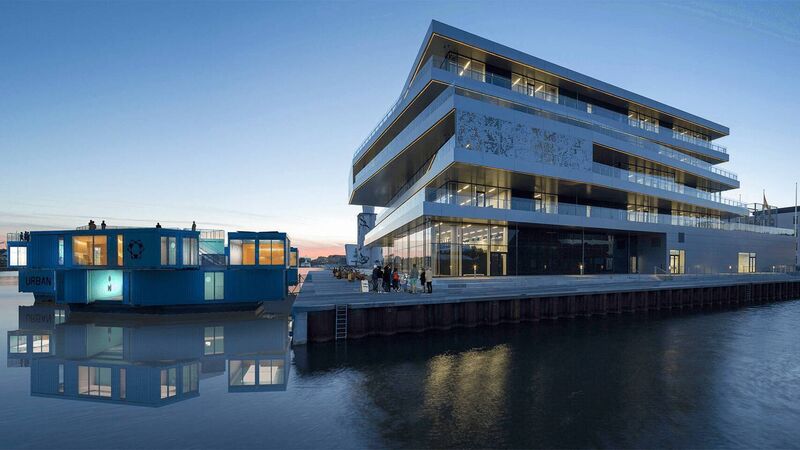Could this be the answer to Cork’s housing crisis?

The Urban Rigger housing unit is a unique floating, flexible, energy-efficient and mobile property, allowing people to live on a river
ONE of the biggest challenges facing Cork city is the lack of available and affordable accommodation. Most commentators refer to it as a crisis, but in crisis there is always opportunity.
To overcome challenges we sometimes need to change the way we look at things, and Cork can lead the way. With the limited amount of available space for housing and development we need to perhaps look to the reason our city was born — the River Lee.
The first phase of Cork city’s development started in about 922, founded by a Danish Viking, Ottir Iarla in the area below St Finbarrs Cathedral. Nearby Keyser Street by Elizabeth fort is the last Norse name in the city.
Ottir’s homeland, Denmark, has through the years developed a reputation for excellence in modern design and innovative architecture.
Cork — with the Docklands regeneration plans — has a real opportunity to make full use of some of the most under-utilised river frontage in Europe in a most innovative and imaginative way, using a proven modular housing system.
Revitalising the waterfront presents a brilliant way to provide attractive, affordable housing, with a gentler environmental impact while making use of available resources.
An innovative design team, Urban Rigger (urbanrigger. com) has developed a modular housing system to work on water.
With the core values of community, affordability and sustainability, a system has been created allowing for waterfront living.
Like other urban centres with limited space, Copenhagen had a pressing need to provide affordable and sustainable accommodation, so the Danes again looked to the water.
This new but proven system of modular floating houses is ideally suited to part of our current housing requirements and addresses real problems in providing affordable and available housing.
We don’t think of converted containers as housing, but the system is perhaps best exemplified by the Grillagh water house in Co. Derry, as featured on Channel 4’s Grand Designs and by Urban Riggers’ own website.
ECONOMY
Cork has become a centre for large IT and hi-tech companies. This growth has bought social and economic vitality to the city, and we need to build on that. However, a major concern for those who work in the field and a determining factor for companies looking to locate here is housing.
The lack of affordable and available accommodation can only have a negative effect on the continued economic development of Cork.
Other cities like Dublin have lost potential employers and opportunities to other locations due to this key requirement. The situation can only be exacerbated by Brexit, as more and more companies look to locate in the EU.
Cork has a unique opportunity in this sense as the city is situated on one of the world’s biggest natural harbours with ample waterfront space in conjunction with the docks redevelopment plan recently announced. By using the river itself, Urban Rigger expands the potential of the docklands redevelopment.

MANUFACTURING
There are few strategies that allow cities to expand. Yet, Cork’s waterfront remains an under-utilised and underdeveloped area at the heart of the city. Cork is ideally placed for the actual production and development of this very affordable and competitive system.
The modular units themselves can be built in Cork, not only the local market, but for other suitable sites in Ireland, most notably Dublin, as well as further afield through export of modules via the new Ringaskiddy container terminal and base units by sea.
This creates further direct employment and opportunities for a wide range of suppliers and trades in Cork.
SUSTAINABILITY
Among the core values of the Urban Rigger system is sustainability. The modules are incredibly energy-efficient and built with the Scandinavian climate in mind.
Integrated solar panels use a small portion of electricity generated to run a hydro-source system with low-energy pumps providing heat, ventilation and waste-water management. The excess power then runs back in to the grid.
The low carbon cost of the units and their energy efficiency future-proofs them for planned carbon tax increases, and is in-line with our current national aim of radically reducing carbon emissions by 2030.
By their very nature, the issue of flooding in Cork is not an issue, and crucially, the Urban Rigger system due to its modularity allows for a relatively quick build time.
Due to Covid-19, the Irish housing crisis has been compounded by the slow-down of current building programs. The Urban Rigger system could allow for us to make up that time.
The planned lifetime for each module is 100 years with minimal maintenance.
COMMUNITY
Accommodation is more than just a roof. The Danish buzz-word Hygge means a sense of belonging, warmth, community. From the start, the Urban Rigger concept focused on creating sustainable, vibrant and dynamic communities. The system is built around a shared central courtyard with community spaces. One can directly access the water from the courtyard, which also has bike racks and even room for kayaks! The units are modular, finished to exacting and demanding standards of cutting edge Scandinavian design.
With that built in flexibility, the design concept is focused on a mixture of starter apartments, but with a little vision and imagination one can see the development of family homes, offices and business spaces.
The Urban Rigger system is only limited by ambition and imagination — it is in many ways the ideal solution to some of the challenges Cork faces.
The Vikings were at the first phase of Cork’s development, and now, a millennium later, it may be well time for the Danish to be part of the next phase: the future is floating for the city on the Lee.
For more information visit: urbanrigger.com or contact sj@urbanrigger.com







 App?
App?




